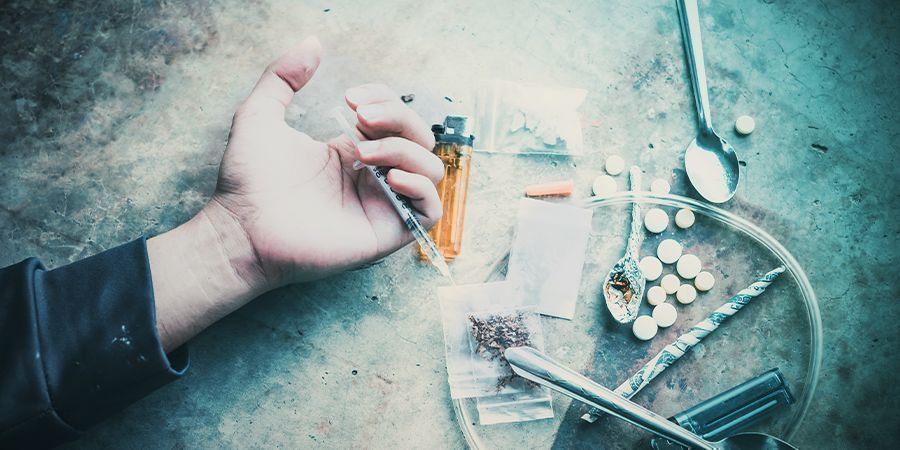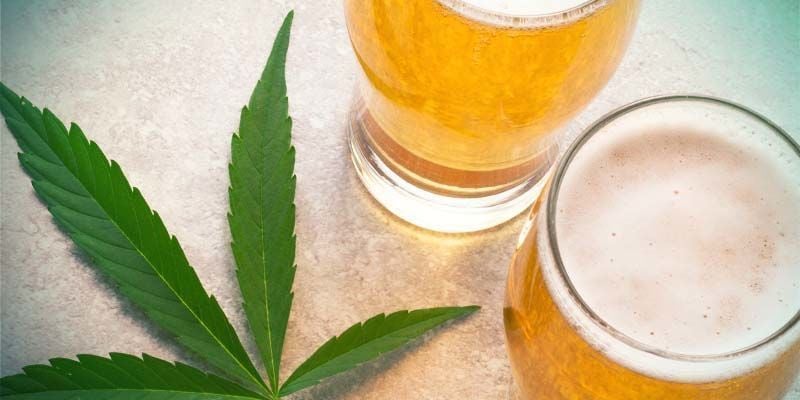
Searching For A Gateway Drug—Cannabis Vs. Alcohol
For decades, we've heard parents, teachers, scientists, and politicians refer to cannabis as a gateway drug. But is dealing with the problem of drug abuse and addiction as simple as pointing a finger at a single substance? And if it is, should that substance even be cannabis?
Welcome to Zamnesia's Editorials, where our writer, Steven, shares his opinion on all things related to the cannabis, CBD, and smartshop industries. Remember, all the views expressed in these articles are those of the author and don't necessarily reflect the opinions of Zamnesia as a company. To share your opinions with our author and our team, make sure to leave a comment.
Smoke a joint one night, and risk waking up with a needle in your arm the next. For those of us that grew up in the ‘80s, ‘90s, and ‘00s, the “gateway drug” theory has been at the centre of our education on drugs.
Growing up in Switzerland in the 1990s, my parents drove past Zurich’s infamous Platzspitz as a way of teaching us kids that “this is what happened if you took drugs”. And cannabis was considered a surefire way of reserving your place among the addicts passed out in the cold.
School teachers and public drug education programmes kept hammering home the same message. Even today, we still hear parents, politicians, and even scientists debate whether drugs like cannabis serve as a gateway to other, “harder” substances.
But what about alcohol? Booze is completely legal and accessible, and, like any other drug, clearly affects our behaviour and decision-making. Could it be that alcohol is actually the “real” gateway drug out there?
HOW ALCOHOL AFFECTS THE BRAIN

Alcohol does one thing really well; it changes the way we feel. It does this by affecting the way our brain cells communicate with each other.
Brain cells, also known as neurons, use neurotransmitters to communicate. These neurotransmitters serve as tiny chemical messengers that transport messages from one neuron to another.
Alcohol directly affects the transmission of specific neurotransmitters in the brain. More specifically, alcohol suppresses the transmission of glutamate while increasing the transmission of GABA. Glutamate is an excitatory neurotransmitter that makes neurons more likely to fire, while GABA is an inhibitory neurotransmitter that makes neurons less likely to do so.
In turn, the flow of information through the brain starts to slow down. That’s essentially why, when we’re drunk, we feel, perceive, and notice less. It’s also what often leaves drunks thinking very profusely about a single thought, like "this is the best night ever!". These effects are also why alcohol is considered a depressant; it depresses both our central and peripheral nervous systems.
Interestingly, while alcohol inhibits our brain functions, it doesn’t inhibit us socially. After all, one of the main reasons we enjoy alcohol so much is because it helps lower our inhibitions, making us feel a little more free and open in social situations.
Alcohol also creates an obvious euphoria which, when coupled with our lowered social inhibitions, is what suddenly gives us the courage to strike up conversation with a stranger, dance on top of a table to Shania Twain, etc.
The bottom line here is that alcohol owes its success as a social lubricant to the fact that it lowers our inhibitions and makes us more likely to act out of character (both in positive and negative ways). So, if we're looking for a scapegoat on which to hang the blame for the issue of global drug addiction, it's hard to find a better "gateway drug" than booze.
Now, you’re probably reading this and thinking “cannabis, just like alcohol, also affects our inhibitions, decision-making, and behaviour”. And of course, you’re right; cannabis, for many people, also helps lower their social, creative, and even sexual inhibitions. But does that mean that experiencing a cannabis high is going to make a person more likely to chase down other, harder substances?
CANNABIS IS NOT A GATEWAY DRUG

In 2016, president of the US Institute for Behavior and Health Dr. Robert L. DuPont wrote a column in the New York Times entitled “Marijuana Has Proven to Be a Gateway Drug”[1]. Dr. DuPont begins his argument with the age-old reasoning that the vast majority of heroin users began their journey into the dark world of drugs with cannabis.
And that's hard to argue against. Undeniably, most heroin addicts have probably tried cannabis. However, that doesn't mean that most cannabis users will move on to try heroin or other, harder substances. In fact, research shows that most people who have tried cannabis don’t even become regular cannabis users.
A 2017 survey by Marist University and Yahoo News interviewed 1,122 US adults over the phone about their experience with cannabis. The study found that 52% of the adults interviewed had tried it, while 22% currently use it (which the survey defined as having used cannabis at least once or twice in the last year). Meanwhile, only 14% of all the people surveyed said they regularly use cannabis at least once or twice per month.
The chance of cannabis users developing dependence or “cannabis use disorder” is even lower still. According to data from the US National Institute on Drug Abuse, only about 9% of the people who use cannabis become addicted to it.
In its report “The Real Gateway Drug”[3], American Addiction Centers makes it very clear that cannabis isn’t the first drug people experiment with. In the report, AAC spoke to over 1,000 Americans about how they started and potentially furthered their experimentation with drugs. Of the people who had used alcohol, close to 66% reported it was the first drug they tried. 23.8% reported that tobacco was the first drug they tried, while only 18% said they started out using cannabis.
In fact, some research even suggests that cannabis can help people wean off other addictive substances. A 2014 study published in The Journal of The American Medical Association, for example, found that US states with medical marijuana laws had nearly 25% fewer opioid-related overdose deaths. That's because cannabis can offer people more effective relief from pain and other symptoms of disease without the health risks associated with prescription medication.
REVISITING THE GATEWAY THEORY

So, where does all this leave us with the gateway drug theory? Is it complete bogus, or is there some truth to the argument that trying some drugs may make us more likely to try others?
Well, there is research to support that some drugs may stimulate reward circuits in the brain that make other substances more appealing.
A 2017 paper published in Science Advances showed that rats who were given alcohol were much more likely to activate a lever that released cocaine. In fact, there’s some really interesting research highlighting a connection between these two drugs in particular.
Even the American Addiction Centers report I mentioned earlier highlighted some patterns in substance use; hallucinogens such as psilocybin mushrooms and LSD, for example, were most often the 4th substance used, and cocaine the 5th.
These findings are definitely interesting, and vouch for further investigation into drug abuse and how it works. However, there is much more compelling evidence that social factors like mental health and poverty are much more likely to be the real gateways to drug use and addiction.
The nature of the drug market also has an impact on how people use and abuse substances. In places like the Netherlands, the use of cannabis and hallucinogenic mushrooms is far less common than in other parts of the world where the two substances are still criminalised.
CLOSING THE GATEWAY DEBATE

So, does experimenting with one drug increase your risk of trying another? Well, maybe. But understanding drug addiction and what drives people to use one substance over another is much more complex than just pointing fingers at a singular substance.
But if you choose to believe that gateway drugs exist, I'd recommend you point your fingers at alcohol and our lax attitudes towards it, rather than cannabis.
- (n.d.). Marijuana Has Proven to Be a Gateway Drug - NYTimes.com - https://www.nytimes.com
- (n.d.). Yahoo News/Marist Poll | Home of the Marist Poll - http://maristpoll.marist.edu
- (n.d.). search - https://americanaddictioncenters.org
- (n.d.). States with medical pot see nearly 25 percent fewer fatal prescription drug overdoses — RT USA News - https://www.rt.com
- (n.d.). Prior alcohol use enhances vulnerability to compulsive cocaine self-administration by promoting degradation of HDAC4 and HDAC5 | Science Advances - http://advances.sciencemag.org
- (n.d.). A Comeback for the Gateway Drug Theory? (Published 2017) - https://www.nytimes.com













 United States
United States










